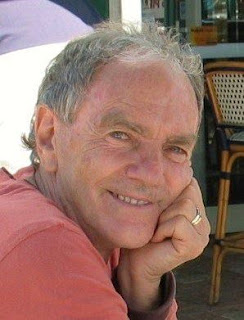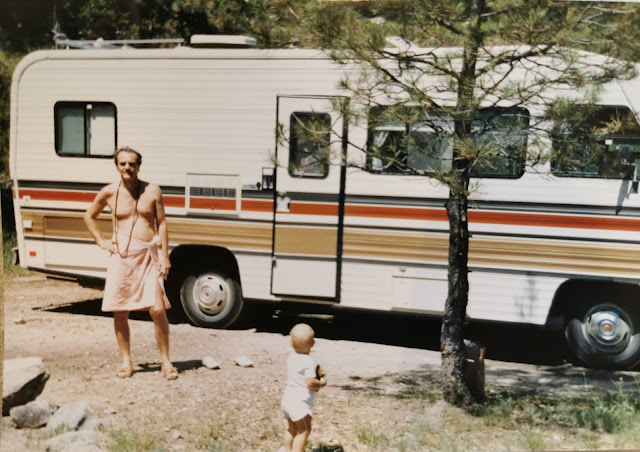Younger Next Year, or on the merits of physical activity.
In spite of the recent setback with immortality (see the post On the Death of the Immortal), I haven't stopped searching for the best ways of living the days that I still have ahead of me. As a part of this search I reached for the New York Times bestseller - a book by Chris Crowley and Henry Lodge, M.D., entitled: "Younger Next Year - Live Strong, Fit, and Sexy - Until You're 80 and Beyond." As I am especially interested in staying "sexy," I picked this title from a plethora of other books on how to live a good life in retirement.
In the Chapter Three - The New Science of Aging - Henry Lodge claims that "Some 70% of premature death and aging is lifestyle related." He differentiates between "aging" as a normal process and "decay" caused most often by lack of activity and overeating. Although we are "stuck with real aging," Lodge writes, "decay is optional." The theory behind is, Lodge explains, is that we give our "physical brain," the brain that is responsible for day to day functioning of our body, so called "wrong signals." Abundance of food, combined with little physical activity, makes the physical brain to believe that it is "winter" - a time to shut down and to hibernate. As a result of this misinterpretation of what is going on outside, the physical brain starts to shut down what it believes to be unnecessary functions of the body. And this means "decay."
The way to reverse this trend, the authors propose, is to make the physical brain convinced that it is still a "hunting season." Our bodies, they claim, a magnificent product of billions of years of evolution, are meant for action. Our ancestors would often hunt long hours every day in order to survive, as still do some bushmen tribes in Africa, Australia or America. Though in reality we don't need to hunt anymore, physical activity is the way to "trick" the physical brain into thinking that it needs to keep all the structures and functions going. That it is a "springtime in the savannah."
To accomplish this, the authors insist, we need to "exercise six days a week for the rest of our life" - no negotiations, no excuses. The books goes into more detail about how this exercise should look like, and I encourage you to read it at length. In summary, they argue for "forty-five minutes of long and slow exercise" six days a week, complemented with with forty-five minutes of weight training twice a week. They also advocate for at least one day a month of "extra-long" activities, such as hiking or bike riding.
Though this is not the entire message - the authors also advocate for proper nutrition and general positive interest in life, the physical activity is at its core.
This is not a new understanding for me. Always interested in sports and physical activity (I used to hike and climb from early age), I was also influenced by the teaching of Haidakhan Babaji that I encountered in the early 1980s. Haidakhan Babaji was a great proponent of Karma Yoga - the yoga of physical labor. His teachings on the subject greatly impressed me as a young therapist, and I would like to quote some of them:
But the time for excuses seems to be running out. When we are young, and do harmful things to our bodies (e.g. I used to smoke), there is still time for the bodies to recover, assuming we change our habits. But when you retire, the threat of decay and death is never too far away. I think I will try to follow Crowley's and Lodge's advice and make an effort to "swim against the tide" to accomplish:
(PR)
In the Chapter Three - The New Science of Aging - Henry Lodge claims that "Some 70% of premature death and aging is lifestyle related." He differentiates between "aging" as a normal process and "decay" caused most often by lack of activity and overeating. Although we are "stuck with real aging," Lodge writes, "decay is optional." The theory behind is, Lodge explains, is that we give our "physical brain," the brain that is responsible for day to day functioning of our body, so called "wrong signals." Abundance of food, combined with little physical activity, makes the physical brain to believe that it is "winter" - a time to shut down and to hibernate. As a result of this misinterpretation of what is going on outside, the physical brain starts to shut down what it believes to be unnecessary functions of the body. And this means "decay."
The way to reverse this trend, the authors propose, is to make the physical brain convinced that it is still a "hunting season." Our bodies, they claim, a magnificent product of billions of years of evolution, are meant for action. Our ancestors would often hunt long hours every day in order to survive, as still do some bushmen tribes in Africa, Australia or America. Though in reality we don't need to hunt anymore, physical activity is the way to "trick" the physical brain into thinking that it needs to keep all the structures and functions going. That it is a "springtime in the savannah."
To accomplish this, the authors insist, we need to "exercise six days a week for the rest of our life" - no negotiations, no excuses. The books goes into more detail about how this exercise should look like, and I encourage you to read it at length. In summary, they argue for "forty-five minutes of long and slow exercise" six days a week, complemented with with forty-five minutes of weight training twice a week. They also advocate for at least one day a month of "extra-long" activities, such as hiking or bike riding.
Though this is not the entire message - the authors also advocate for proper nutrition and general positive interest in life, the physical activity is at its core.
This is not a new understanding for me. Always interested in sports and physical activity (I used to hike and climb from early age), I was also influenced by the teaching of Haidakhan Babaji that I encountered in the early 1980s. Haidakhan Babaji was a great proponent of Karma Yoga - the yoga of physical labor. His teachings on the subject greatly impressed me as a young therapist, and I would like to quote some of them:
(...) Only through Karma Yoga can you advance in your life; your heart becomes purified, your thinking will be good. Karma Yoga is also beneficial for your health; you will sleep well and have a good appetite. A man with good appetite and sound sleep is always a healthy man and with good health he can achieve anything in life. (Teachings of Babaji, P.79.)
Everyone who comes here should be prepared to do any kind of work. In this Age, work purifies and is the best spiritual practice (sadhana). (...) Work is so good that it prevents disease and gives you mental ease. Work is such a good thing that it relieves man of all ailments. (Teachings of Babaji, P.24.)(For more quotations of Haidakhan Babaji on the merits of karma yoga and work, you can visit www.onegodsite.net/work.html)All through my professional and personal life, I could see the truth of these teachings. A great proportion of people seeking mental health help are the people who have become inactive. Sometimes people are forced into this situation (for instance, by lay-offs, extended periods of unemployment, or work accidents), but in a great many cases, I believe, inactivity is just a habit. It was always painful for me to see how much pain, physical and mental, was caused by the habits of inaction. In many cases, people would like to quench this pain with pain-killers, or by sleeping through it. As it simply means more inaction, these strategies appear to only make things worse. In spite of all this suffering, in my experience, people often react with resentment to the suggestion that they should try to become more active physically. They are often quite creative in finding excuses why they cannot do so.
But the time for excuses seems to be running out. When we are young, and do harmful things to our bodies (e.g. I used to smoke), there is still time for the bodies to recover, assuming we change our habits. But when you retire, the threat of decay and death is never too far away. I think I will try to follow Crowley's and Lodge's advice and make an effort to "swim against the tide" to accomplish:
A life characterized by strong, aerobically fit muscles. a healthy heart, lean body, good bones, good immune system, high sex drive (! - my exclamation) and an alert, inquisitive, optimistic mind geared toward working well in groups and building social networks.(p.37)And how I have been doing so far? I exercise, but seldom six days a week, and this involves some weight training (Bowflex). I do mostly stretching, but some aerobic exercises, such as outdoor and indoor bike. September was a good month for all-day outdoor aerobic activities, which I described in my other blog. If you are interested, see the photo-stories from scrambling of Mount Rundle in Banff or Heart Mountain near Canmore. I think, if I stay active through our harsh Canadian winter, I have a chance to feel "younger next year." If I remain sexy ... you tell me! :-)
(PR)





Comments
Post a Comment